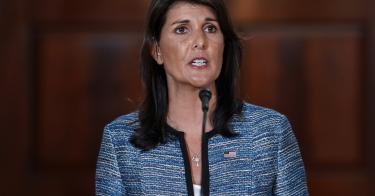The UN Human Rights Council is a disgrace. No democracy should listen to the council, much less participate in it. The Trump administration’s decision to quit this rotten body was not merely right. It embodies the way we should treat failed international institutions.
Criticism of the council often begins with its record on Israel. There is a good reason for this: the council spends a wildly disproportionate share of its time on Israel.
As of the end of May, the council had adopted 169 condemnatory resolutions on countries. Of those, nearly half (47 percent) focused on Israel. There is no way that the human rights situation in Israel is as bad as it is North Korea, Iran, Russia, Zimbabwe, and all the world’s other autocracies put together.
But this is not just about Israel. The council’s membership is terrible. Freedom House deems 14 of its 47 members be “not free.” Saudi Arabia, Venezuela, and Cuba should not be sitting in judgment on the human rights records of other nations.
Predictably, the council also focuses disproportionately on the United States. The council has never condemned China. The country that has received the most recommendations for improvement is — of course — the United States.
It is not easy to find anyone who defends the council as it is. The most common criticism of the administration’s decision, as Rob Berschinski at Human Rights First puts it, is: “Countries like China, Russia and Venezuela will applaud this decision because we are freely giving up leverage over them that we previously had.”
The obvious response to this argument is that, given the council’s membership and record, U.S. leverage through the council has not been worth much. But there are deeper issues here.
A common argument raised in favor of U.S. membership of international organizations is that the United States brings prestige that will lead other nations to respect the organizations. This is often described as the argument for American leadership.
But if the United States brings prestige to what are purportedly good organizations, why does the same argument not apply to bad ones? If we take this argument seriously, we have to conclude that, by remaining in the council, the United States is lending prestige to it. Why should we do that?
Moreover, quitting an international organization can be a constructive step. When the United States quit Interpol in 1950, it led the organization to write a new constitution that forbids Interpol from involvement in political, racial, or religious persecution.
Interpol today is far from perfect. But that constitution makes it possible to hold Interpol to account, and makes it clear that politicized abuse of Interpol is against the rules. If the United States had not quit Interpol in 1950, the organization likely would have been swamped by abuse and died.
Defenders of failed international organizations do those organizations an enormous disservice by refusing to hold them to real standards. If you have real standards, you will find that, on occasion, the only way to uphold them is to walk out, which is what the United States has done.
By refusing to walk out, liberals are not protecting the international order they purportedly cherish. They are ensuring that abuse of it received their tacit support, and embracing an unthinking defense of the status quo not because it works, but merely because it exists.
There is a simple standard by which the United States should judge every international organization. If it works without bias, compatibly with the Constitution, with professionalism, and practically advances aims or values that are in the U.S. interest, it deserves our support. If not, it doesn’t.
The Human Rights Council does few, if any, of these things. We have tried to remedy its biases from the inside. Leaving now is a way to demonstrate our support for values enshrined in the council’s name — values that it reliably traduces in practice.
This piece originally appeared in Newsday



